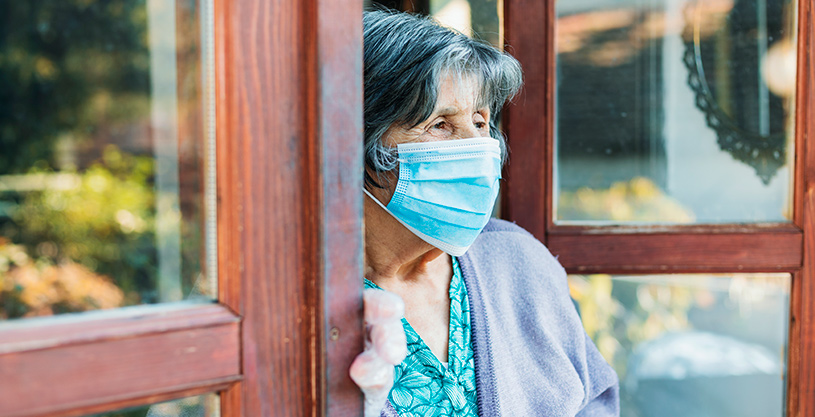We know that adults aged 65 and older are at higher risk of developing severe illness from COVID-19, and physical distancing has been critical in protecting older adults from infection. But this drastic change in social life has come with physical and mental health risks of its own.
Kim Kletter, MA, a Care Manager at Seniors At Home, says that many of the seniors she cares for have experienced increased anxiety and even depression during the pandemic.

Kim says, “Most seniors are not seeing family, attending social daytime programs, or going out the way that they used to. They’re really feeling the loss of human connection, and the biggest challenge is not knowing when it is going to end.”
Connecting from a Distance
The good news, Kim says, is that there are ways for seniors to seek out social connection in this new climate, and for their families and senior care professionals to support them from afar.
“The advice that I give my clients is to put on a mask and go outside—get fresh air! Put a chair on the porch and chat with neighbors or walk the neighborhood.”
As a Care Manager, Kim would typically meet with seniors in person for an hour or so in their home. Now, she stands outside the door while her client is in the house with the door open.
“It’s so important for me to see them so that I can evaluate their physical condition and mindset. Even though my meetings are much shorter now, we’ve been creative and have found ways to work within our constraints.”
Kim shares that one of her clients even drives to Kim’s office as usual, but sits in the car with the window down. They meet like this in the parking lot, talking from over six feet away. This continuity of connection has been essential for Kim’s clients, and it is just as important for family and friends to do the same with their loved ones. Below is Kim’s advice for supporting seniors during the pandemic.
Connecting with an Aging Loved One During the Pandemic
- Be socially creative. Help your loved one find creative ways to connect while still being physically apart, such as talking to friends on the phone, becoming a pen pal, or setting up a recurring video call with the family.
- Social Distance with Social Media. If appropriate, set them up on social media. There are many seniors and senior groups on Facebook. This could be a way to connect with friends and family near and far.
- Surprise them! For example, even if they say they have enough food, arrange for a delivery of groceries and include their favorite treats, or have dinner delivered from their favorite restaurant. If possible, bring it yourself!
- Add a sense of purpose. Encourage them to help others in need. Whether it’s becoming a phone call volunteer, tutoring, or writing letters to others, activities like these will create purpose in their day.
- Organize a game night. Popular board games have gone virtual! Classics like Monopoly, Scattergories, and Scrabble can be played online, along with many card games, trivia, and other fun activities to do together.
- Consider hiring an in-home caregiver—For seniors who need a little extra help around the house, a caregiver can assist with daily living, but also with companionship and conversation. They can also facilitate calls and video chats with loved ones.
The Silver Lining
Throughout the pandemic, everyone has been leaning on technology more than ever as tools for socializing with friends and family. As a result, many older adults who were previously not using certain devices or technology have become more tech-savvy than ever!
This newfound comfort in technology opens the door to more services, groups, and programs for seniors in the future. When the pandemic fades, people of all ages will have new abilities and tools to connect with those they love.
If you or someone you know needs assistance, reach out to Seniors At Home for a consultation—415-449-3700.
Seniors At Home is a division of Jewish Family and Children’s Services, a trusted nonprofit institution that has been providing care since 1850. Our services are funded by fees and by donations for those who cannot afford the full cost of care for these critical services.
If you would like to make a donation, please contact Barbara Farber at BarbaraF@jfcs.org, 415-449-3858, or click here to give online.